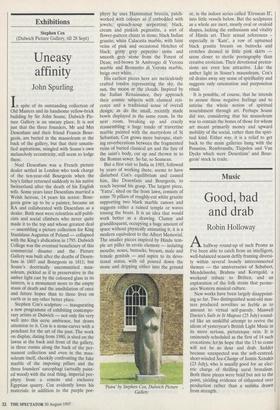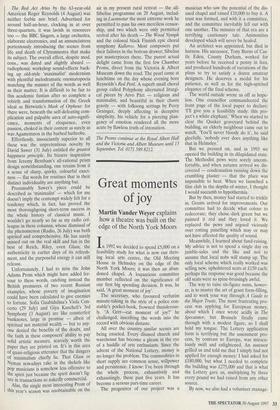Music
Good, bad and drab
Robin Holloway
Ahalfway round-up of such Proms as I've been able to catch from an intelligent, well-balanced season deftly framing diversi- ty within several loosely interconnected themes — the anniversaries of Schubert, Mendelssohn, Brahms and Korngold, a weekend tribute to Britten, and an exploration of the folk strain that perme- ates Western musical culture.
New works have been largely disappoint- ing so far. Two distinguished semi-old mas- ters produced novelties so feeble as to amount to virtual self-parody. Maxwell Davies's Sails in St Magnus (25 July) sound- ed like an unskilful attempt to revive the idiom of yesteryear's British Light Music in its more serious, picturesque vein. It is ominously scheduled as the first of 14 such evocations; let us hope that the 13 to come will not be so dour and drab. Sadder because unexpected was the soft-centred, short-winded Sea-Change of Iannis Xenakis (23 July), who is usually good for an elec- tric charge of thrilling aural brutalism. Both these pieces were brief but not to the point, yielding evidence of exhausted over production rather than a summa drawn from strength. The Red Act Arias by the 63-year-old American Roger Reynolds (4 August) was neither feeble nor brief. Advertised for around half-an-hour, clocking in at over three-quarters, it was lavish in resources too — the BBC Singers, a large orchestra, elaborate electronics, and an annunciatress portentously introducing the scenes from life and death of Clytemnestra that make its subject. The overall effect, despite mod. cons., was dated and slightly absurd — radiophonic workshop sound-effects back- ing up old-style `maximalise modernism with plentiful melodramatic onomatopoeia matching the manner of the words as well as their matter. It is difficult to be fair to this academic fustian after so complete a rebirth and transformation of the Greek ideal as Birtwistle's Mask of Orpheus: for there were, beneath the self-defeating com- plication and palpable aura of auto-signifi- cance, moments of eloquence, even passion, choked in their context as surely as was Agamemnon in the barbed bathrobe. Effortlessly, insouciantly superior to all these was the unpretentious novelty by David Sawer (31 July) entitled the greatest happiness principle. Its bizarre inspiration from Jeremy Bentham's all-rational prism design notwithstanding, one retains from it a sense of sharp, quirky, colourful exact- ness — flat words for routines that in their distinct individuality are anything but. Presumably Sawer's piece could be described as 'minimalist' — which for me doesn't imply the contempt widely felt for a tendency which, in fact, has proved the most thoroughgoing short-term success in the whole history of classical music. I wouldn't go nearly so far as my radio col- league in these columns, whose dismissal of the phenomenon (Radio, 26 July) was both spirited and comprehensive. He has surely missed out on the real skill and fun in the best of Reich, Riley, even Glass; the authenticity in earlier days of its refresh- ment, and the purposeful energy it can still release.
Unfortunately, I had to miss the John Adams Prom which might have added fer- vour to these words, catching instead the British premieres of two recent Russian examples, whose poverty of imagination could have been calculated to give enemies to fortune. Sofia Guabidulina's Viola Con- certo (29 July) and Giya Kancheli's 3rd Symphony (3 August) are like counterfeit banknotes, large in promise — albeit of spiritual not material wealth — but to any- one denied the benefits of the doubt, and the faith in these composers' ability to pay solid artistic measure, scarcely worth the paper they are printed on. It's in this area of quasi-religious utterance that the dangers of minimalism chiefly lie. That Glass or Nyman nowadays rake in the shekels like pop musicians is somehow less offensive to the spirit just because the spirit doesn't fig- ure in transactions so nakedly commercial. Alas, the single most interesting Prom of this year's season was unobtainable on the air in my present rural retreat — the all- Sibelius programme on 20 August, includ- ing in Luonnotar the most extreme work he permitted to pass his own merciless censor- ship, and two which were only permitted revival after his death — The Wood Nymph and the colossal black Finnish epic choral symphony Kullervo. Most composers put their failures in the bottom drawer; Sibelius put masterpieces there. The purest actual delight came from the first few Chamber Proms, direct from the Victoria & Albert Museum down the road. The pearl came at lunchtime on the day whose evening bore Reynolds's Red Peril. A superb small choral group called Polyphony alternated liturgi- cal pieces by Arvo Part — religious and minimalist, and beautiful in their chaste gravity — with folksong settings by Percy Grainger, deeply affecting in deceptive simplicity, his vehicle for a piercing plan- gency of emotion rendered all the more acute by flawless truth of intonation.
The Proms continue at the Royal Albert Hall and the Victoria and Albert Museum until 13 September. Tel. 0171 589 8212.



















































 Previous page
Previous page